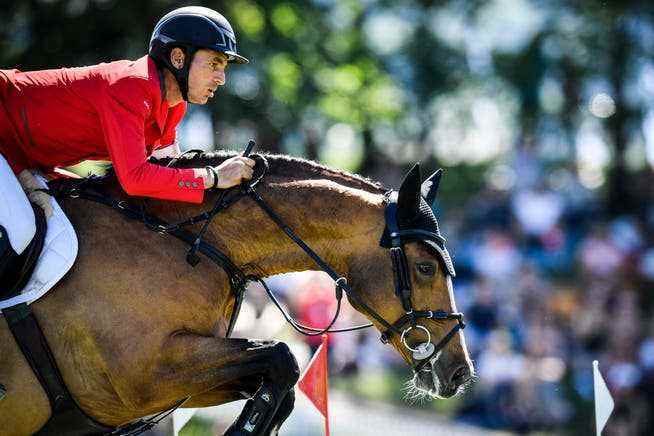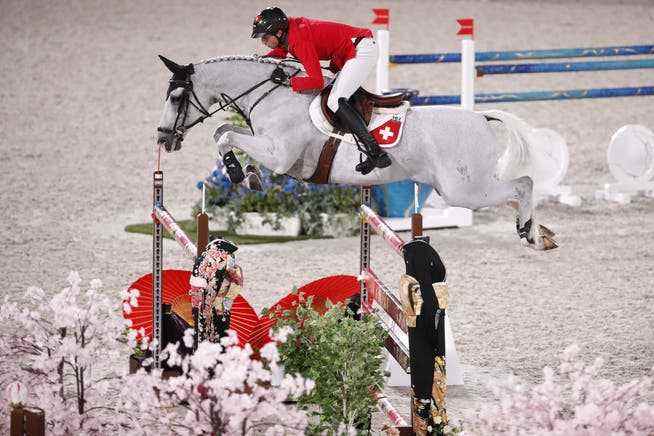Bianca, Clooney, Twentytwo des Biches: Within ten months, the Swiss show jumping team lost a trio of horses that guaranteed success. It is all the more astonishing that the rider Martin Fuchs nevertheless got into a frenzy of success.
Bryan Balsiger on his horse Twentytwo des Biches in action at the Tokyo 2021 Olympic Games. The horse suffered a broken leg in a fall in March 2022.
Success in equestrian sport is a fragile commodity. June 2021: The mare Bianca dies of a brain tumor. Steve Guerdat would have wanted to start with her at the Summer Games in Tokyo, but the postponement of the Olympics by a year thwarted this plan. With Bianca, Guerdat had risen to the top of the world rankings.
August 2021: Martin Fuchs – today’s world number 2 – posts on social networks: “Pray for our Clooney.” Fuchs reports that his gray gelding suffered a serious shoulder injury when he fell on a local pasture. Clooney, decorated with EM gold in 2019 and with more than two million francs in prize money, is no longer returning to top-class sport and is retiring. He should spend the old age in the vastness of Normandy.
March 2022: The strong emerging Bryan Balsiger falls with his Olympic horse Twentytwo des Biches at a concours in Paris, the mare breaks her leg. You, too, now face a life of retirement in Normandy. Within ten months, the Swiss show jumping team lost three of their best horses. How was that to be endured? Bryan Balsiger says: “We have moved even closer together.”
When Chaplin suddenly entered the big stage again
This is backed up statistically: just a few hours after the news of Bianca’s death, the Swiss won the Nations Cup in La Baule. Barely three weeks after Clooney’s accident, they conquered the European Championship title with the team, Martin Fuchs also won silver in the individual event.
Fuchs even got into a frenzy of success, although with Clooney he had lost the horse that the world association had meanwhile honored as the “Horse of a Lifetime”. Fuchs won the lucrative Grand Prix in Geneva and the World Cup final in Leipzig – in the latter he relied on Chaplin on a horse that he had had to patiently nurse after an injury break.
Welcome home Clooney! ❤️
Martin Fuchs and Clooney are undeniably a match made in heaven. ?
They’ve given us heartfelt moments over the years, as well as #jumping excellence to inspire us all.
Our hearts are full to hear that #clooney has recovered and come home! ? ? pic.twitter.com/hqILzXKMGD
— The FEI (@FEI_Global) October 21, 2021
Because many tournaments had been canceled due to the pandemic, it already seemed as if the time on the big stages had run out for the aging Chaplin. In between, he was sent to a Dutch breeding farm as a stallion. Then came the brilliant comeback in Leipzig, which was also a consolation for the horse’s owner, Luigi Baleri from Zurich, who had only just recovered from the injury to his Clooney.

2012 Olympic champion Steve Guerdat on Bianca. The mare died of a brain tumor last year.
Fuchs was also able to absorb the loss of his top horse so well because the owners of his animals are not known to regard their four-legged friends as objects of speculation that are supposed to bring in millions of dollars in trade. The actions of the patrons suggest that they see their horses in the Fuchs stables in the long term, under the Swiss flag. This ensured a smooth successor for Clooney.
The owner Baleri may take up less space today than before, but the next guarantor for stability was ready: Adolfo Juri, a former ice hockey player at HC Ambri-Piotta, owns the ten-year-old gray gelding Leone Jei, and he has developed so splendidly that that he will be Fuchs’ first choice for the World Championships in August in Denmark.
There are also family ties that come into play here: the daughter of the industrialist Juri once went to St. Gallen to study, and the passionate horsewoman found a prominent riding instructor there in Markus Fuchs. He was then allowed to compete with horses of the Juris at the highest level. A privilege that has now been passed on to his nephew Martin.
Sometimes several million francs are not enough
Anyone who wants to be regularly at the top of the biggest tournaments today needs a large number of top horses, and it has become difficult to get hold of them. Martin Fuchs’ father Thomas is a horse dealer and the national trainer of the Swiss team. He says: “Those owners who want to prevent another nation from being strengthened by selling a horse also exist abroad, which is why they turn down even the best offers. The prices for ready-made five-star horses have exploded.”

Martin Fuchs with Clooney at the Tokyo 2021 Olympic Games. The gray gelding is now spending his retirement in Normandy.
Twenty years ago, one million Swiss francs was enough to buy such a horse, today sometimes not even several million are enough. “An insane amount has to be raised for eight-year-old top horses. That’s why the trick is to discover great talent at the age of six and to do something yourself to increase the market value,” says Thomas Fuchs.
A CHAMPION HAS BEEN CROWNED. ?
All behold the Jumping superstar duo who gave us life and love in Leipzig, Martin Fuchs and Chaplin! ? ?#TimeToBeat #FEIWorldCupFinals pic.twitter.com/HmNjVBecZV
— The FEI (@FEI_Global) April 10, 2022
The strong position of the Fuchs family in the scene has also been an advantage for other members of the Swiss team. Bryan Balsiger fills the vacuum created by the end of Twentytwo des Biches’ career with the spirited mare Dubai, a Fuchs addition. Balsiger will start Dubai this Pentecost weekend at the CSIO St. Gallen.
The Sprunger case: The horse King Edward was lost to Sweden – and won Olympic gold
But national interests have not always been safeguarded. The Basel bidder Janika Sprunger has already advanced into the world class more than once before the owners of their horses decided to make a spectacular sale.
The sale of the gelding Palloubet d’Halong in 2013 for eleven million francs, as the NZZ wrote at the time, is legendary. It made things a little more bearable from a Swiss point of view because the horse ended up in Qatar, the Arabians never became a serious competitor. Palloubet d’Halong soon faded from focus.
The change from the beginning of 2020 was even more important, when the gelding King Edward was no longer saddled by Sprunger, but by her Swedish partner Henrik von Eckermann. Sprunger became pregnant, took a break from major tournaments and saw von Eckermann and King Edward in Tokyo win Olympic gold for his home country with the team.
These days, at the CSIO St. Gallen, the strong Swedes are missing – which increases the chances of the Swiss team that they will once again win the Nations Cup at this event; the last home win was 26 years ago. In view of the rather manageable competition, this should be possible – even with horses that don’t have that much routine yet.
